March 15, 2023
Thesaurus : Doctrine
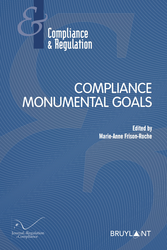
► Full Reference: S. Lochmann, "ESG Rating Agencies and Compliance as an Effective Way of Increasing International Competitiveness", in M.-A. Frison-Roche (ed.), Compliance Monumental Goals, coll. "Compliance & Regulation", Journal of Regulation & Compliance (JoRC) and Bruylant, 2023, p. 389-400.
____
📘read a general presentation of the book, Compliance Monumental Goals, in which this article is published.
____
► Summary of the article:
________
Feb. 2, 2023
Publications

🌐♾️ follow Marie-Anne Frison-Roche sur LinkedIn
🌐subscribe to the Newsletter MAFR Regulation, Compliance, Law
____
► Full Reference: M.-A. Frison-Roche, "Le juge, l'obligation de compliance et l'entreprise. Le système probatoire de la Compliance" ("The judge, the compliance obligation, and the company. The Compliance probationary system"), in M.-A. Frison-Roche (ed.), La juridictionnalisation de la Compliance, coll. "Régulations & Compliance", Journal of Regulation & Compliance (JoRC) and Dalloz, 2023, p 409-442.
____
📝read the article (in French)
____
🚧read the bilingual Working Paper which is the basis of this article, with additional developments, technical references and hyperlinks
____
📕read a general presentation of the book, La juridictionnalisation de la Compliance, in which this article is published
____
► Summary of the article (done by the Journal of Regulation & Compliance): the article aims to identify the link that must be established between the company in its relationship with the compliance obligations it assumes and the judges to whom it is accountable in this respect: this link is established by evidence. The evidentiary system of proof has yet to be constructed, and it is the purpose of this long study to lay the groundwork.
To this end, the article begins with a description of what is designated here as the "probatory square" in a "probatory system" that is superimposed on the system of rules of substantive legal system. This is all the more important because Compliance seems to be in frontal collision in its very principles with the general principles of the evidentiary system, in particular because it seems that the company would have to prove the existence of the Law or that it would have to bear in a definitive way the burden of proving the absence of violation, which seems to be contrary not only to the presumption of innocence but also to the principle of the freedom of action and of undertaking. In order to re-articulate Compliance Law, the obligations of compliance which legitimately weigh on the company, it is necessary to return to the probatory system specific to Compliance, so that it remains within the Rule of Law. This presupposes the adoption of a substantial definition of Compliance, which is not only compliance with the rules, which is only a minimal dimension, but implies that Compliance Law should be defined by the Monumental Goals on which the public authorities and the companies are in substantial alliance.
The evidentiary system of principle makes play between its four summits that are the burden of proof, the objects of proof this evidentiary square of principle, between the burden of proof, the means of proof and their admissibility. Compliance Law does not fall outside this evidential square, thus marking its full membership of the Rule of Law
In order to lay the foundations of the evidential system specific to Compliance Law, the first part of the article identifies the objects of proof which are specific to it, by distinguishing between the structural devices, on the one hand, and the expected behaviours, on the other. The first involves proving that the structures required to achieve the Monumental Goals of Compliance have actually been put in place. The object of proof is then the effectiveness of this implementation, which presents the effectiveness of the system. As far as behavioral obligations are concerned, the object of proof is the efforts made by the company to obtain them, the principle of proportionality governing the establishment of this proof, while the systemic efficiency of the whole reinforces the evidential system. However, the wisdom of evidence lies in the fact that, even though the principle remains that of freedom of evidence, the company must establish the effectiveness, efficiency, and effectiveness of the whole, independently of the burden of proof.
The second part of the article concerns those who bear the burden of proof in Compliance Law. The latter places the burden of proof on the company in principle, in view of its legal obligations. This burden comes from the legal origin of the obligations, which blocks the "round of the burden of proof". But in the interference of the different vertices of the evidentiary square, the question becomes more delicate when it comes to determining the contours of the compliance obligations that the company must perform. Moreover, the burden of proof may itself be the subject of proof, just as the company's performance of its legal obligations may also be the subject of contracts, which brings us back to the evidentiary system ordinarily applicable to contractual obligations. The situation is different when it comes to a "compliance contract" or when it comes to one or more compliance stipulations, concepts that are still not very well developed in Contract Law.
Furthermore, as all branches of Law belong to a legal system governed by the Rule of Law, other branches of law interfere and modify the methods and solutions of proof. This is the case when the fact, which is the object of proof, can give rise to a sanction, the Law of repression imposing its own solutions in the matter of the burden of proof.
In the third part of the article, the relevant means of proof in Compliance Law are examined, used in that Compliance Law is above all a branch of Law whose object is on the one hand information and on the other hand the Future. Open questions remain, such as whether companies could be forced by the Judge to build technologies to invent new means of proof. To show that they are indeed achieving the Monumental Goals they are charged with.
In the fourth part, the vital character of the pre-constitution of evidence is shown, which is the reflection of the Ex-Ante nature of Compliance Law: evidence must be pre-constituted to avoid the very prospect of having to use it, by finding all the means to establish the effectiveness, efficiency and even the effectiveness of the various Compliance Tools.
If companies do all this methodically, the Compliance evidence system will be established, in harmony with the general evidence system, Compliance Law and the Rule of Law.
________
Oct. 5, 2022
Interviews

🌐suivre Marie-Anne Frison-Roche sur LinkedIn
🌐s'abonner à la Newsletter MAFR Regulation, Compliance, Law
____
► Référence complète : M.-A. Frison-Roche, " Youporn : Le Droit doit se renouveler face à la transformation du monde par l'espace numérique", entretien avec Olivia Dufour, Actu-juridique, 5 octobre 2022.
___
💬Lire l'entretien dans son intégralité
____
Lire l'entretien précédent : 💬L'efficacité de la Compliance illustrée par l'affaire Youporn
____
► Présentation de l'entretien par le journal : "Comment parvenir à bloquer efficacement l’accès des mineurs aux contenus pornographiques sur internet ? C’est à cette difficile question que s’est attaquée l'Arcom (Autorité de régulation de la communication audiovisuelle et numérique). Avec pour l’instant un succès mitigé. Début septembre, alors que le régulateur demandait au juge de bloquer les cinq sites n’ayant pas obéi à son injonction de modifier leurs conditions d’accès, la justice a décidé de renvoyer le dossier devant un médiateur. Entre temps, un rapport sénatorial publié le 28 septembre souligne l’urgence d’agir. Nous avons demandé au professeur Marie-Anne Frison-Roche, spécialiste de droit de la compliance, comment à son avis il est possible de lutter efficacement contre les dérives de l’industrie pornographique".
____
► Questions posées :
- Dans l'affaire Youporn, la décision du tribunal judiciaire de renvoyer le dossier vers la médiation a suscité un certain émoi. N'est-ce pas le signe d'une forme de renoncement de la justice, avec tout ce que cela implique d'un point de vue symbolique ?
- En quoi le droit de la compliance serait-il plus efficace que les méthodes traditionnelles ?
- Mais n’est-ce pas, d’une certaine façon leur permettre de s’autoréguler, solution que précisément le rapport sénatorial écarte radicalement, estimant qu’elle n’est pas efficace ?
- Le problème, à en croire les sites concernés, c’est qu’il n’y aurait pas de solution qui soit à la fois efficace et respectueuse de la protection de la vie privée…
- Pensez-vous que la compliance ait une chance de réussir là où les outils plus traditionnels connaissent un échec relatif ?
________
Sept. 1, 2022
Thesaurus : Doctrine

► Full Reference: S. Lochmann, "Les agences de notation ESG et l'effectivité de la compliance face à la compétitivité internationale" ("ESG Rating Agencies and Compliance as an effective way of increasing international competitiveness"), in M.-A. Frison-Roche (ed.), Les Buts Monumentaux de la Compliance, coll. "Régulations & Compliance", Journal of Regulation & Compliance (JoRC) and Dalloz, 2022, p. 401-412.
____
📕read a general presentation of the book, Les Buts Monumentaux de la Compliance, in which this article is published
____
► Summary of the article (done by the Journal of Regulation & Compliance): The purpose of this article is to show that the markets, those who provide them with financing and those who draw on them, need information on the environmental, social and governance dimensions of the companies involved, ESG rating agencies are companies that contribute to the overall performance of the system and converge on the Monumental Goals that drive Compliance Law.
From this perspective, and taking Moody's as a concrete example, the article first explains the role played by an ESG rating agency and its evaluation methodology, in particular the criteria used and the way in which companies inform the markets and stakeholders in this area, particularly with regard to climate change, converging in this respect with the public authorities and with the various international texts, treaties and texts of soft law that follow one another.
This convergence between the activity of ESG rating agencies and Compliance Law in that it is organised normatively around Monumental Goals is particularly marked in the organisation of a "just transition", with the agency's activity being inserted into the construction of European texts. It thus appears that the ESG investment ecosystem is in full evolution, implying full collaboration between all participants in the financing industry for sustainable financing and, ultimately, the permanence of democracy.
________
June 2, 2021
Thesaurus : Doctrine
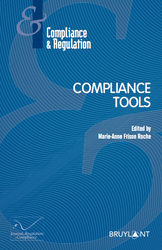
Full reference : Galland, M., The Regulator's Inspection of the Effectiveness of the Compliance Tools Implemented by the Company, in Frison-Roche, M.-A. (ed.), Compliance Tools, serie "Régulations & Compliance", Journal of Regulation & Compliance and Bruylant, 2021, p. 211-224.
Read a general presentation of the book in which the article has been published.
___
Summary of the article (done by Marie-Anne Frison-Roche)
The author underlines the complexity of the measure of the effectivity of compliance tools because the measure of the risks cannot be mechanical, the exercise is a cost whose the advantage does not appear immediately, the essential is in the behaviors that the firm masters with difficulty while these are results that are evaluated, because Compliance tools must be effective and produce tangible results.
To do that, the regulator intervenes in Ex Ante in order to the applicable texts are understandable by the firm and in order to the tool is working. When a noncompliance occurs, the regulator must beyond the sanction build on this measure of ineffectiveness to lead operators to improve their systems. Thus, it is in terms of "Compliance effort" that the regulator's control works, especially through the observation of an "embodied exemplarity".
Read the summaries of the other articles of the book.
____
April 21, 2021
Thesaurus : Doctrine
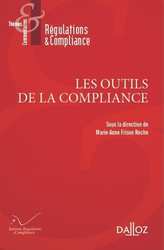
► Full Reference: M. Galland, "Le contrôle par le régulateur de l’effectivité des instruments de Compliance mis en place par l’entreprise", in M.-A. Frison-Roche (ed.), Les outils de la Compliance, coll. "Régulations & Compliance", Journal of Regulation & Compliance (JoRC) and Dalloz, 2021, p. 195-208.
____
📕read a general presentation of the book, Les outils de la Compliance, in which this article is published
____
► Summary of the article (done by the Journal of Regulation & Compliance): The author underlines the complexity of the measure of the effectivity of compliance tools because the measure of the risks cannot be mechanical, the exercise is a cost whose the advantage does not appear immediately, the essential is in the behaviors that the firm masters with difficulty while these are results that are evaluated, because Compliance tools must be effective and produce tangible results.
To do that, the regulator intervenes in Ex Ante in order to the applicable texts are understandable by the firm and in order to the tool is working. When a noncompliance occurs, the regulator must beyond the sanction build on this measure of ineffectiveness to lead operators to improve their systems. Thus, it is in terms of "Compliance effort" that the regulator's control works, especially through the observation of an "embodied exemplarity".
________
Dec. 7, 2020
Thesaurus : Doctrine
Full reference: Vergnolle, S., L'effectivité de la protection des personnes par le droit des données à caractère personnel (The effectiveness of the protection of people by personal data Law (our translation)), Passa, J. (dir.), thesis, Law, Panthéon-Assas University (Paris II), 2020, 531 p.
Read directly and only the table of contents (in French)
To go further about regulation of personal data, read:
- Frison-Roche, M.-A., Rethinking the world from the notion of data, 2016
- Frison-Roche, M.-A., The regulatory conséquences of a world redesigned from the concept of data, 2016.
Sept. 16, 2020
Publications

🌐follow Marie-Anne Frison-Roche on LinkedIn
🌐subscribe to the Newsletter MAFR Regulation, Compliance, Law
____
Full reference: M.-A. Frison-Roche, Se tenir bien dans l'espace numérique, in Penser le droit de la pensée. Mélanges en l'honneur de Michel Vivant, Lexis Nexis and Dalloz, 2020, pp. 155-168.
____
📝Read the article (in French)
____
English summary of the article: The digital space is one of the scarce spaces not framed by a specific branch of Law, Freedom also offering opportunity to its actors to not "behave well", that is to express and diffuse broadly and immediately hateful thoughts through Hate speechs, which remained before in private or limited circles. The intimacy of Law and of the legal notion of Person is broken: Digital permits to individuals or organizations to act as demultiplied and anonymous characters, digital depersonalized actors who carry behaviors that are hurtful to other's dignity.
Against that, Compliance Law offers an appropriate solution: internalizing in digital crucial operators the mission to disciplinary and substantially hold the digital space. The digital space has been structured by powerful firms able to maintain order. Because Law must not reduce digital space to be only a neutral market of digital prestations, these crucial operators, like social networks or search engines, must be forced to substantially control behaviors. It could be about an obligation of internet users to act with their face uncover, "real identity" policy controlled by firms, and to respect others' rights, privacy rights, dignity, intellectual property rights. In their Regulatory function, digital crucial firms must be supervised by public authorities.
Thus, Compliance law substantially defined is the protector of the person as "subject of law" in the digital space, by the respect that others must have, this space passing from the status of free space to the one of civilized space, in which everyone is obliged to behave well.
______
Read to go further:
- Frison-Roche, M.-A., L'apport du Droit de la Compliance à la gouvernance d'Internet, 2019
- Frison-Roche, M.-A. (dir.), Internet, un espace d'interrégulation, 2016
March 5, 2020
Conferences

Référence : Frison-Roche, M.-A., La mesure de l'effectivité et de l'efficacité des outils de la compliance (conception, présentation et modération des débats), in Les outils de la Compliance, Journal of Regulation & Compliance.
Voir les autres thèmes, autres dates et autres manifestations particulières du cycle dans son ensemble.
Cette conférence sert d'appui à la réalisation d'un ouvrage plus global portant d'une façon générale sur Les outils de la Compliance.
L'ouvrage Compliance Tools sera publié en même temps.
Présentation de la Conférence : Après avoir examiné différents outils spécifiques, comme La cartographie des risques ou Les incitations, et avant d'en aborder d'autres comme ceux relevant de la a Compliance by Design, celle-ci méritant aussi d'être examinée avec quelque distance dans sa prétention à être la solution à tout enjeu de compliance, il convient de regarder comment l'on mesure l'efficacité de tous ces outils de Compliance. En effet, puisque toutes les techniques sont des "outils", ils ne prennent sens qu'au regard d'une finalité qu'ils doivent atteindre effectivement. Cette effectivité doit être mesurée, et cela dès l'Ex Ante, l'entreprise devant en permanence donner à voir l'effectivité de la performance des outils de la Compliance.
Mais autant les normes prolifèrent, les discours se multiplient, les engagements sont pris, autant les techniques de mesure de l'effectivité de l'ensemble semblent assez faibles. Non pas que les sujets de droit astreints aux obligations de Compliance ou désireux de réaliser les buts systémiques ou de bien commun visés par la Compliance ne désirent pas en avoir, mais ces instruments de mesure semblent encore les moins construits, souvent déclaratifs ou de type discursifs, ou trop mécaniques. Dès lors, est-ce en partant du but que l'on cherche à atteindre que l'on doit mesurer l'efficacité des outils de Compliance, sans que cela transforme les tâches qui pèsent de grè ou de force sur les opérateurs en obligation de résultat ? Ou est-ce en demeurant en amont, par une seule "conformité" à ce qui leur est demandé, comme comportement et comme organisation structurelle, que les entreprises donnent à voir qu'elles ont effectivement rempli leur tâche, sans plus se soucier des effets produits sur la réalité des choses, cette réalité que ceux qui ont conçu la norme avaient en tête ?
Cette question a des implications majeure en terme de charge de preuve et de responsabilité, impliquant des organisations plaçant la confiance, coeur de la Compliance, plutôt dans des instruments technologiques connectant des data ou plutôt dans des personnes ayant le sens du bien commun. Cette question est aujourd'hui ouverte.
_____
Jan. 2, 2020
Thesaurus : Doctrine
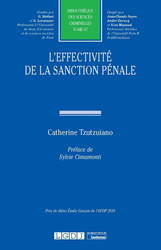
Full reference: Tzutzuiano, C., L'effectivité de la sanction pénale (written in French), Collection "Bibliothèque des sciences criminelles", n°67, LGDJ-Lextenso, February 2020, 429 p.
Jan. 4, 2017
Thesaurus : Doctrine
Référence complète : Holtse, C., Maersk: Antitrust compliance in a global context, Revue Concurrences, n°1-2017, pp. 10-14.
Les étudiants de Sciences Po peuvent consulter l'article via le drive, dossier "MAFR - Régulation & Compliance"
Oct. 20, 2016
Thesaurus : Doctrine
Référence complète : Gamet, L., Droits de l'homme, urbi et orbi, Droit social, 2016, p. 1046 et s.
Résumé de l'article (par l'auteur) : Une fois affirmée l'universalité des droits de l'homme au travail, se pose la question de leur effectivité. Aucun tribunal international n'ayant été institué pour condamner un État défaillant, comment faire pour que les droits de l'homme au travail soient respectés de par le monde, sans consacrer un droit d'ingérence dans les affaires nationales des États souverains ? L'initiative publique trouve aujourd'hui, de façon subtile, un puissant relais dans l'initiative privée.
Dec. 11, 2014
Conferences

Prendre le thème de "l'effectivité de la régulation bancaire" est presque un pléonasme, dans la mesure où la régulation se définit comme un corps de principes, de règles et de décision formant un appareillage prenant son sens dans le but qu'il a pour fonction de concrétiser. Ainsi la régulation est entièrement dans son "effectivité".
Cela déplace d'autant la question, qui devient non pas en premier lieu la mesure de l'effectivité mais la détermination du but au regard duquel cette effectivité se mesure. Or, la régulation bancaire peut avoir plusieurs buts, la multiplicité des buts diminuant son effectivité, tandis que la contradiction entre les buts l'anéantit. Dans la nouvelle architecture européenne, le but a le mérite d'être clair, qualité majeure du système par rapport au modèle nord-américain : il s'agit d'assurer la solidité du système bancaire.
L'unicité et la clarté du but est déjà un gage d'effectivité. Mais c'est la prochaine crise qui montrera donc l'effectivité de la régulation, la prochaine crise évitée (mais alors comment la connaître ?) ou la prochaine crise qui se déroulera, puis sera maîtrisée, c'est-à-dire le bon déclenchement du mécanisme de résolution bancaire, là où réside la véritable innovation.
S'il y a "nouvelle donne", c'est dans le fait même que la régulation bancaire est désormais "européenne". Cela est tout autant étonnant que la matière touche aux souverainetés. C'est en cela que paradoxalement le "citoyen européen" qui continue de ne pas exister, faute d'Europe politique, pourrait exister à travers une régulation bancaire européenne, puisque celle-ci manie la "monnaie souveraine".
Oct. 24, 2014
Publications
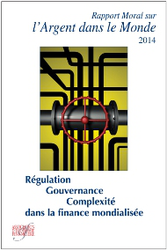
Référence complète : FRISON-ROCHE, Marie-Anne, La nature prométhéenne du droit en construction pour réguler la banque et la finance, in Rapport Moral de l'Argent dans le Monde 2014, Régulation. Gouvernance. Complexité dans la finance mondialisée, Association d'Économie financière, 2014, p.37-48.
On croit que le droit est plus que jamais puissant en régulation bancaire et financière : il envahit tout et apparait sous sa forme la plus terrible qu'est le droit pénal et le droit administratif répressif. Cela ne paraît que le début : tout est droit ! Il faut pourtant considérer que le droit est plus faible que jamais.En effet, si le droit de régulation bancaire et financière est devenu avant tout répressif, c'est parce qu'il est faible. Il n'est plus que la voie d'exécution d'une multitude de règles microscopiques, une sanction s'adossant à toute prescription. Mais la répression a perdu son autonomie, tandis qu'elle se débarrassait des droits de la défense. Plus encore, le droit s'est dégradé en réglementation. La régulation va vers un amas aléatoire de prescriptions peu compréhensibles, dans un droit qui s'essouffle à poursuivre l'imagination des opérateurs. Alors que ceux-ci auraient besoin d'un droit qui fixe par avance et clairement des lignes. C'est donc un droit faible et de mauvaise qualité vers lequel la régulation bancaire et financière va et par lequel elle est envahie. Le juriste ne peut qu'être tout aussi chagriné que le financier.
Cet article a été établi à partir d'un working paper.
Nov. 22, 2013
Conferences
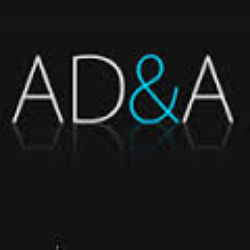
Les agents économiques sont autant soucieux des régulateurs que des juges. Il est très difficile de mesurer la compétitivité des décisions de ceux-ci, en dehors des formules générales que l’on assène aisément sur la nécessité de rapidité, de prévisibilité et de sécurité. Mais ce sont des qualités que l’on demande à toute source de contrainte. En outre, concernant les décisions des juges et des régulateurs, la difficultient tient au fait qu’il est difficile de scinder une décision de la procédure qui la procéde.Retour ligne automatique Quand on interroge les économistes, ils disent que l’essentiel est que l’agent sache à quoi s’en tenir pour établir ensuite ses coûts. Pour cela, il faut précisément que ces décisions, quelle que soit leur nature juridique, constituent une "jurisprudence". Retour ligne automatique Mais si en premier lieu, si l’on abord la question d’une façon générale, pour que l’on puisse parler de "jurisprudence", il faut qu’il y ait un corps de "doctrine". Ainsi, paradoxalement, les régulateurs ont davantage une jurisprudence que le monde judiciaire, disparate. Retour ligne automatique En second lieu, on ne peut avoir une vision globale, il convient de partir des cas. Ainsi, la jurisprudence de la chambre sociale est-elle "compétitive" ? Son dogmatisme ne la rendait-elle pas plus prévisible ? Plus encore, un arrêt récent de la première chambre civile de la Cour de cassation qui récuse l’analyse économique du droit, revendiquant l’imperméabilité normative entre les deux ordres que sont l’économie et le droit, est-il compétitif ? Retour ligne automatique Ensuite et en second lieu, indépendamment des réponses générales, il est toujours pertinent d’analyser au cas par cas les décisions. Ici, sont prises 4 décisions récentes du second semestre 2013, de la Cour de cassation, du Conseil d’Etat et de l’Autorité des Marchés Financiers.
Accéder aux slides de la conférence.
Lire le Working Paper ayant servi de support à la conférence.
Les travaux du colloque ont été publiés en avril 2014 dans la Revue Droit & Affaires : lire l'article.
Updated: July 31, 2013 (Initial publication: Sept. 20, 2011)
Teachings : Les Grandes Questions du Droit, semestre d'automne 2011

Updated: July 31, 2013 (Initial publication: Oct. 17, 2011)
Teachings : Les Grandes Questions du Droit, semestre d'automne 2011

May 1, 2013
Thesaurus : Doctrine
Référence complète : Pera, A. et Codacci Pisanelli, G., Prevention of antitrust violations: which role for compliance programs?, E.C.L.R., 2013, n°34(5), pp. 267-273.
Les étudiants de Sciences Po peuvent lire cet article via le drive dans le dossier "MAFR - Régulation & Compliance"
June 19, 2012
Publications
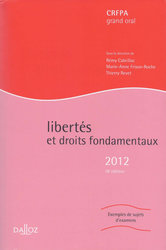
L'accès à la justice et l'accès au droit ont partie liée en ce qu'il faut parfois saisir un juge pour que son droit subjectif soit effectif et parce qu'il faut d'abord connaître le droit pour s'en prévaloir en justice. Mais il faut aussi parfois écarter les procédures, et son droit au juge, pour trouver directement satisfaction, par les règlements alternatifs des différents. Le droit positif a posé le droit d'accès au juge, allant jusqu'à l'exécution, mais non d'une façon aussi forte le droit de former recours. Plus encore, l'accès au droit demeure le plus souvent de l'ordre de la politique publique plutôt que de la prérogative effective.
Référence complète : FRISON-ROCHE, Marie-Anne, Le droit d'accès à la justice et au droit, in , CABRILLAC, Rémy, FRISON-ROCHE, Marie-Anne et REVET, Thierry (dir.), Libertés et droits fondamentaux, 18ième éd, Dalloz, 2012, Paris, p. 535-555.
Lire le résumé de l'article ci-dessous.
Sept. 23, 2009
Conferences
July 16, 2009
Thesaurus : Doctrine
June 14, 2003
Conferences
April 20, 1996
Publications
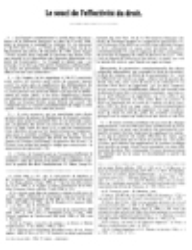
Référence complète : BARANÈS, William et FRISON-ROCHE, Marie-Anne, Le souci de l’effectivité du droit, D. 1996, chron., p. 301-303
Lire l'article.
Dec. 14, 1994
Conferences